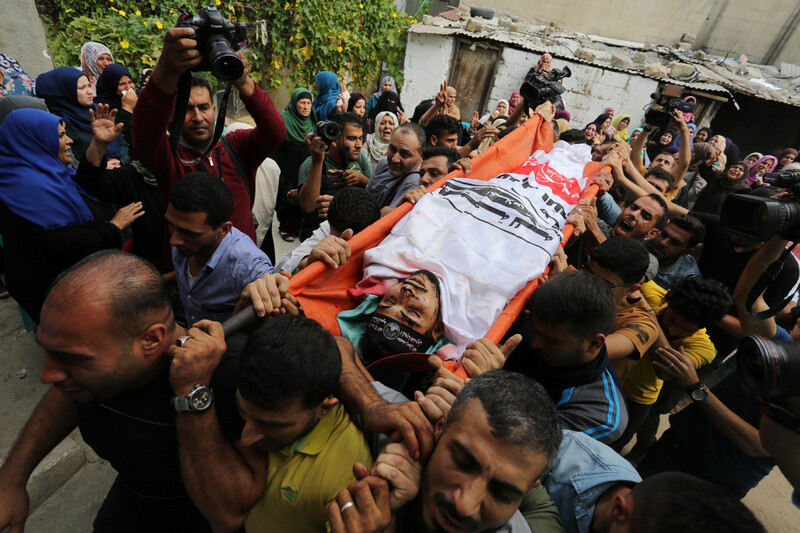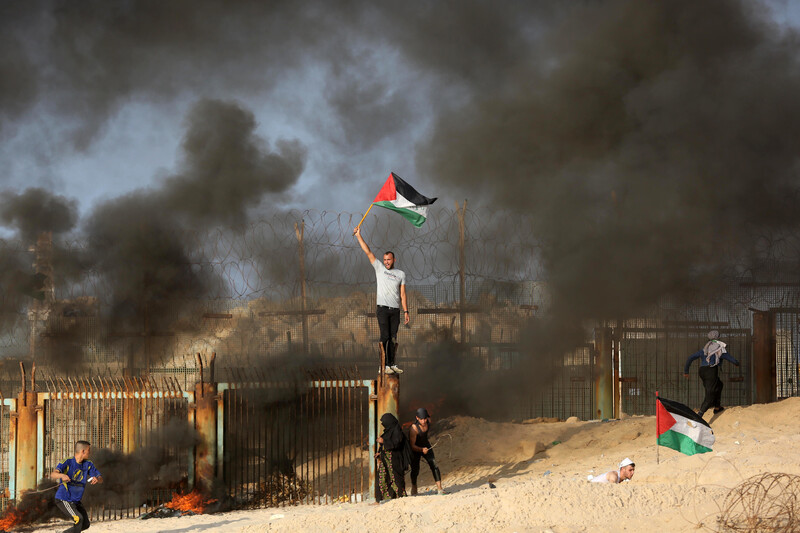Rights and Accountability 17 October 2018

Mourners carry the body of Naji al-Zaanin, 25, after he was killed in an Israeli airstrike, Beit Hanoun, northern Gaza Strip, 17 October.
APA imagesIsrael must launch another war on Gaza to enforce its blockade on the territory, defense minister Avigdor Lieberman told reporters on Tuesday.
Lieberman’s comments came the day before Israel launched a series of airstrikes in retaliation for a rocket fired from Gaza that badly damaged a house in the city of Beersheba.
Lieberman also ordered the closing of crossings between Gaza and Israel and reduced the permitted fishing zone off of Gaza’s coast to three nautical miles – decisions described by the human rights group Gisha as “deliberate punishment of the residents of Gaza for no fault of their own.”
The health ministry in Gaza said that one Palestinian was killed as a result of an airstrike in the north of the territory. Three others were reported injured in Israeli attacks in Gaza’s southern and central districts.
The Israeli air force published a video showing the moment when Naji Muhammad al-Zaanin, 25, was killed in northern Gaza:
The military claimed that the video shows it striking at a squad attempting to launch rockets into Israel.Hamas and Islamic Jihad, two Palestinian resistance factions, denied any involvement in the rocket fire, which they said aimed to torpedo ongoing international efforts to broker a long-term ceasefire with Israel in exchange for the lifting of the siege on Gaza.
But as factions in Gaza have continued to seek a negotiated way out, Israeli leaders continue to beat war drums.
“When Hamas says that it’s going to continue rioting on the border until there’s an end to the blockade, we need to accept that as it is, without interpretations,” Lieberman stated during a Tuesday press conference at Re’im military base, located to the east of the Gaza Strip.
Lieberman ordered a halt to fuel deliveries to Gaza on Friday after several Palestinians crossed into Israel from Gaza during protests.
On Saturday he stated that “As long as the violence doesn’t come to a complete stop in the Gaza Strip, including the dispatch of incendiary balloons and burning tires across from Israeli settlements, there will be no renewal of fuel and gas deliveries to the Gaza Strip.”
The United Nations has been mediating efforts to ensure the delivery of fuel to stave off a collapse of essential services in Gaza, with several trucks of Qatari-funded fuel delivered to the Strip last week.
“Since we’ve allowed the United Nations to bring fuel [into Gaza], we have only gotten high-profile violence,” Lieberman said on Tuesday, insisting that lifting the economic blockade, now in its 11th year, “has one meaning … allowing Hizballah members and Iranians into Gaza.”
He called on Israel’s security cabinet to “land a strong blow” against Hamas – even if it risks a “wide-scale confrontation” – to crush mass protests held along Gaza’s eastern boundary over the past six months.
The primary call of the Great March of Return protests has been to end to Israel’s siege and support Palestinian refugees’ right to return to the lands now inside Israel from which their families were expelled.
Every two in three Palestinians in Gaza, which has a population of around two million, is a registered refugee.
Israel’s blockade has thrust Gaza’s population into poverty and the United Nations has repeatedly warned that the Strip will become an “unlivable place” by the year 2020 if underlying conditions aren’t reversed.
The International Committee of the Red Cross has affirmed that the siege “constitutes a collective punishment imposed in clear violation of Israel’s obligations under international humanitarian law.”
“To me, there’s only one formula: reconstruction in return for disarmament,” Lieberman stated Tuesday.
If his view prevails – in which resistance groups in Gaza must in effect surrender in exchange for basic humanitarian needs to be met – then the chances of a durable truce would appear slim.
Netanyahu’s threats
Lieberman’s comments on Tuesday echoed threats made by Israeli Prime Minister Benjamin Netanyahu days earlier.
“If they don’t stop the attacks against us, they will be stopped in a different way and it will be painful – very painful,” Netanyahu said of Hamas during a security cabinet meeting on Sunday.
“We are very close to a different kind of activity, an activity that will include very powerful blows. If it has sense, Hamas will stop firing and stop these violent disturbances, now.”
Israeli media have reported that defense officials have told the security cabinet that a large-scale confrontation in Gaza is not necessary. But soldiers deployed along the Gaza perimeter are being commanded to “respond more forcefully” to protesters this coming Friday.
A senior military official told the Israeli daily Haaretz that a major operation in Gaza, where health and water and sanitation infrastructure are on the verge of collapse, would lead to a humanitarian catastrophe. This would make it impossible for Israel “to fight without being barraged by international criticism,” according to the newspaper.
Israel’s army wants to hold off on a major military confrontation until the end of next year, when the building of infrastructure intended to thwart tunnels underneath the Gaza boundary is due to be completed.

Palestinians gather along the sea barrier along Gaza’s maritime boundary with Israel during a protest against the blockade on 15 October.
APA imagesMore than 160 Palestinians have been killed during the Great March of Return protests, including 33 children.
On Tuesday Gaza’s health ministry announced that Saddam Abu Shalash, 27, died from injuries sustained during protests north of Beit Lahia one day earlier.
More than 30 Palestinians were injured by live ammunition fired by Israeli forces during Monday’s protest.
Demonstrators cut through the boundary fence at Israel’s Zikim beach and raised a Palestinian flag over it on Monday.
Palestinian media also reported that protesters cut through the boundary fence east of Deir al-Balah in the central Gaza Strip on Tuesday:
Explosives were used to blow open a gate at the boundary fence at the same location: Prior to the strikes early Wednesday, Israeli warplanes repeatedly fired on Gaza this week, the army claiming it was responding to groups planting explosive devices along the boundary and launching flaming kites into Israel.The Israeli military confirmed that snipers shot a Palestinian at point-blank range during protests last Friday after several demonstrators approached the boundary fence under the cover of smoke from burning tires and set off an explosion that made a hole in the fence.
Paratroopers fired shots toward the group of protesters, dispersing all but three who moved towards a snipers’ position.
“Two of them were shot immediately and the third Palestinian reached the sandy mound where the snipers were positioned,” Haaretz reported. “The [military] investigation describes how one of them shot him from point blank range and that a knife was found on his body.”
Palestinian killed in West Bank
Meanwhile Israeli soldiers shot and killed a Palestinian man in the occupied West Bank on Monday.
The military claimed that Elias Yassin, 22, was attempting a stabbing attack when soldiers opened fire on him in the Barkan industrial settlement, where two Israelis were killed earlier in the month by a Palestinian coworker who remains at large.
No Israelis were injured in Monday’s incident.
Seven Israelis and eight Palestinian assailants and alleged assailants have been killed in the context of alleged attacks since the beginning of the year.
On Tuesday Israeli occupation forces raided the home of Yassin’s family in the village of Bidya in the northern West Bank.
Bidya is also the place of residence of Ayesha Muhammad al-Rabi, who died after suspected Israeli settlers stoned the car in which she and her family were traveling last Friday.
Israel’s domestic intelligence apparatus has reportedly launched an investigation into the woman’s slaying, though a gag order has been placed on the probe.
Al-Rabi’s death was condemned by US officials as well as Nickolay Mladenov, the UN’s Middle East envoy.
Israeli tourism minister Yariv Levin, however, described the slaying of the mother of eight as a “scrap of an incident” and pointed to what he called the hypocrisy of those who condemned it.“Terror incidents of stone throwing happen every day; not only don’t they condemn the matter, they give the feeling that it is okay because we are ‘occupiers,’” Levin stated.
“It is quite galling that it takes an incident like this in relation to a Palestinian vehicle for it [stone throwing] to be raised on the agenda.”
The UN Office for the Coordination of Humanitarian Affairs recently said that settler violence was on the rise since the beginning of the year, “with a weekly average of five attacks resulting in injuries or property damage, compared with an average of three in 2017 and two in 2016.”
The day before al-Rabi was killed, the Israeli human rights group Yesh Din published video of settlers from Yitzhar stoning Palestinian cars on a road near the Palestinian village of Burin in the northern West Bank as soldiers looked on without intervening.
That incident took place about four miles north of the Zaatara checkpoint where al-Rabi’s car was stoned.






Comments
i dont think war will be good
Permalink indian defence replied on
i dont think war will be good option, but lets see what happens